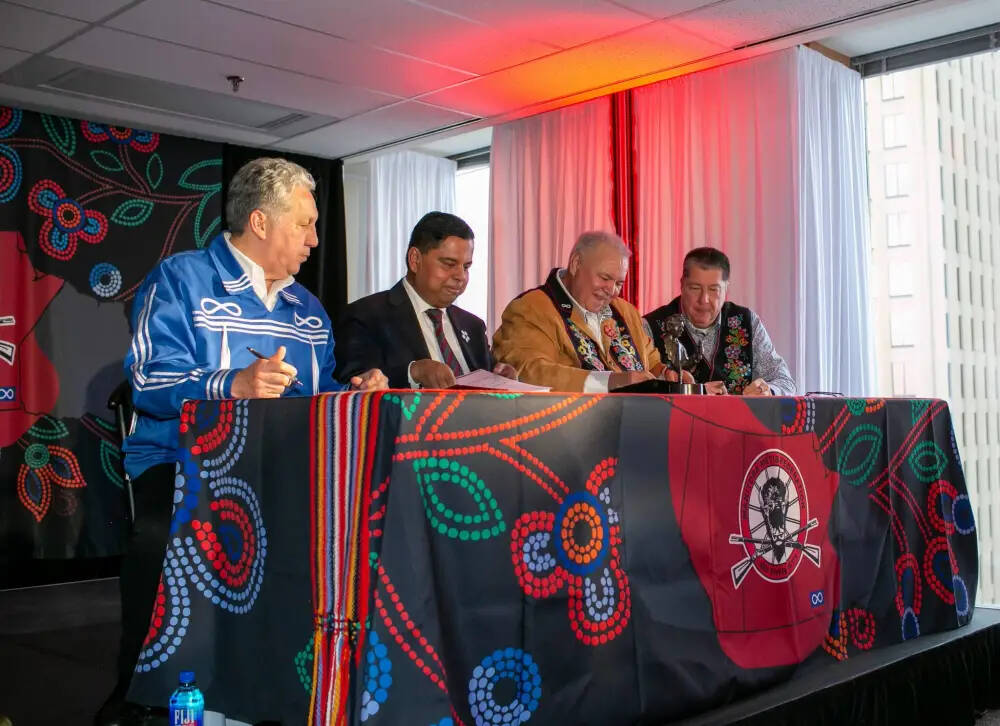
It didn’t take long for the Canadian government in 1870 to backtrack on its commitment to the Red River Métis after negotiating the terms of the Manitoba Act with them earlier that year.
Less than two months after Manitoba officially joined Canada on July 15, 1870 — following negotiations in Ottawa with then-prime minister John A. Macdonald — British troops and two Canadian militia battalions paddled into the Red River Settlement looking for a fight, hoping to hunt down Métis leader Louis Riel and those who took part in the Red River Resistance.
The Métis, who made up the vast majority of the approximately 12,000 people living in the Red River Settlement at the time, were deceived.
Manitoba Métis Federation President David Chartrand (second from right) signs a copy of the Red River Métis Self Government Treaty at the MMF building in Winnipeg Saturday, along with (from left) Minster of Norther Affairs Dan Vandal, Federal Minister of Crown-Indigenous Relations Gary Anandasangaree and lead negotiator for the Red River Métis, Allan Benoit. (Brook Jones / Free Press)
Canadian militia, led and influenced by Col. Garnet Wolseley, spent the next several months (in some cases years) assaulting and killing members of the Métis community — in what became known as the “reign of terror” — driving many out of their homeland.
Wolseley, who returned east shortly after arriving but who left behind a group of volunteer militia — some of whom terrorized the Métis — would later write in his memoirs that he and his men felt they had to “settle accounts quickly” with Riel and his supporters and that he would have hanged the Métis leader if caught. (They never caught him, but Riel was hanged 15 years later following the Battle of Batoche in present-day Saskatchewan).
“Had we caught him, he would have had no mercy,” wrote Wolseley, whose disdain for the Métis and his disparaging remarks about them no doubt influenced his troops. Wolseley described the Métis provisional government as the “ridiculous little republic the French party had set up at Fort Garry.”
He was hoping to do battle with them when his troops arrived, even though the military expedition was supposed to be a mission of peace following successful negotiations in Ottawa.
Wolseley wrote that “all the ranks were keenly anxious to pitch into those cruel half-breed rebels and longed to hang Riel on the spot.”
That was not what was agreed to in the spring of 1870 when the federal government hosted three delegates from Red River to negotiate the terms of Manitoba’s entry into Canada.
In that agreement, which became part of Canada’s Constitution, Ottawa agreed — among other things — to distribute specific land grants to Métis families, to protect their political and economic rights and to preserve the French language.
The spirit of the Manitoba Act was not only to ensure that the Métis could maintain their way of life after Canada extended its jurisdiction westward, it was supposed to facilitate a peaceful co-existence between Indigenous and non-Indigenous people in an environment of mutual respect.
However, Macdonald, his government and the military violated those commitments before the ink was even dry on the newly minted act. It was a tragic chapter in Canada’s early history and a black mark on the country’s treatment of Indigenous people.
So when — 154 years later — the federal government last Saturday signed a first-of-its kind treaty with the Manitoba Métis Federation recognizing it as the official government of the Métis people, it was a historic moment in Canadian history, one that will attempt to right the wrongs of the past.
It’s why tears flowed and Red River fiddle music filled the air during the treaty-signing ceremony on the 20th floor of 333 Main St. in downtown Winnipeg (a building recently purchased by the MMF), just a few blocks north of where Riel and the Métis set up their first provisional government in November 1869 at Upper Fort Garry.
“People don’t know what our people have suffered through,” MMF president David Chartrand said at the ceremony. “Being treated as worse than second-class. Being pushed aside…. But (from) this day forward it’s going to change.”
Canada’s mistreatment of the Red River Métis had a long-lasting impact. Many Métis were marginalized, excluded and denigrated for generations. They were made to feel unwelcome in their own homeland.
It’s no wonder Chartrand used fighting words Saturday.
“No government, no political stripe, can ever bring us down again,” he said. “We will take anybody on and that’s what this treaty will give us. It’ll give us the strength, it’ll give us the pride, it’ll give us the wisdom and the (guarantee to) our young generation that it will never ever happen again.”
It was a momentous day not only for the Métis, but for all Canadians.
You can learn more about the backstory to this in my new book Treaties, Lies and Promises: How the Métis and First Nations Shaped Canada, which details the armed resistance in Red River (including how the Métis blocked a lieutenant-governor designate at the U.S. border), the establishment of two provisional governments, the high-powered negotiations in Ottawa and the ensuing marginalization and mistreatment of the Métis. (Full disclosure: I am donating half my book royalties to the Winnipeg Aboriginal Sport Achievement Centre).
It’s not only fascinating Canadian history (the book began as a series of feature pieces in the Free Press); knowing those stories helps us better understand the efforts today by the Métis to reclaim their rights and continue to inject pride into their community.

Tom Brodbeck
Columnist
Tom Brodbeck is a columnist with the Free Press and has over 30 years experience in print media. He joined the Free Press in 2019. Born and raised in Montreal, Tom graduated from the University of Manitoba in 1993 with a Bachelor of Arts degree in economics and commerce. Read more about Tom.
Tom provides commentary and analysis on political and related issues at the municipal, provincial and federal level. His columns are built on research and coverage of local events. The Free Press’s editing team reviews Tom’s columns before they are posted online or published in print – part of the Free Press’s tradition, since 1872, of producing reliable independent journalism. Read more about Free Press’s history and mandate, and learn how our newsroom operates.
Our newsroom depends on a growing audience of readers to power our journalism. If you are not a paid reader, please consider becoming a subscriber.
Our newsroom depends on its audience of readers to power our journalism. Thank you for your support.


